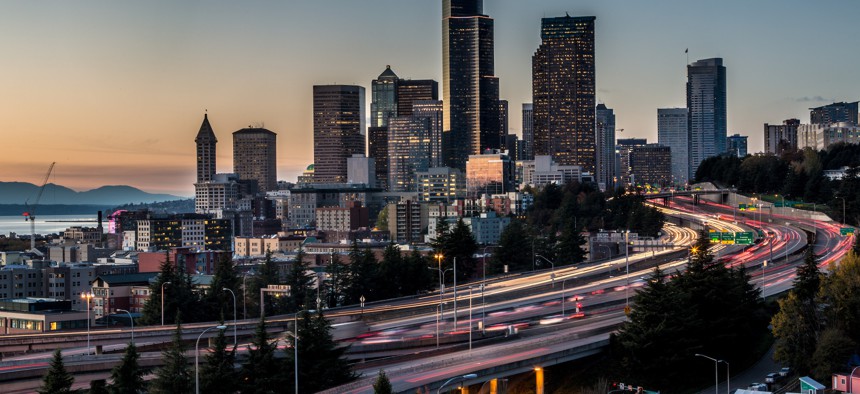Feds open new round in $500M grant program for transportation tech

George Rose/Getty Images
The second year of SMART grants will award another $100 million to state, local and tribal governments for safe, equitable and sustainable transportation solutions.
The application process to award $100 million in federal grants that state and local governments can use to pay for cutting-edge transportation projects opened this week.
The U.S. Department of Transportation announced on Tuesday the second round of its Strengthening Mobility and Revolutionizing Transportation, or SMART, program. The $500 million in competitive grants, which are funded through the 2021 bipartisan infrastructure law, will be distributed over five years.
Earlier this spring, grantees from the first round were announced. In total, the department handed out $94 million to 59 projects across 33 states to fund projects that show how technologies like autonomous vehicles, roadside sensors and aerial drones can be incorporated into transportation systems to tackle problems like traffic congestion, crashes and a lack of commuting options for workers.
Kansas City, Missouri, for example, won more than $725,000 to use data to retime its downtown traffic signals to improve the flow of traffic.
Buffalo, New York; Los Angeles; Minneapolis; Philadelphia; and Portland, Oregon, were each awarded nearly $2 million to leverage sensors and data to help them allocate their curb space to better serve local businesses, facilitate deliveries and integrate with transit and active transportation.
And communities in Colorado, Maine and Massachusetts received a collective $4.2 million for smart grid projects to prepare for more widespread adoption of electric vehicles.
“The department is investing in new technology solutions that make our transportation systems safer and more efficient,” Robert C. Hampshire, deputy assistant secretary for research and technology at USDOT, said in a statement. “Last year’s inaugural SMART grants reflected this dynamic, centering on solutions in areas like safety, transit innovation, and managing public space, addressing pressing challenges in communities with right-sized innovations.”
Funding for the program is being released in two phases. The first is for planning and prototyping, with awardees receiving about $2 million each. From that group, the department will select final grantees for individual awards of around $15 million that can be used to carry out projects.
The current SMART notice of funding opportunity issued this week is still for the first phase. Under it, the program seeks to fund “innovation aimed at solving real-world transportation problems and focused on building data and technology capacity and experience for state, local and tribal governments.”
“We are incredibly focused on targeting problems that the community is clearly trying to solve, where we know that there is just going to be a ton of energy, either at the transportation department or a transit agency, or a local government. Where we’re sure that those kinds of investments also will lead to really transformative change,” said Ben Levine, a senior advisor for research and technology at the USDOT.
“I think the grand vision for this kind of a program is that we can seed ideas that then are cultivated or demonstrated locally and then can become new methods that are taken on across the country,” he added. Levine made his remarks last September during a panel discussion at Smart City Expo USA.
Levine stressed that the department will favor grant applications that feature collaboration between eligible governments and companies, academic institutions and community organizations.
Governments have until Oct. 10 to apply for this latest round of SMART grants.





